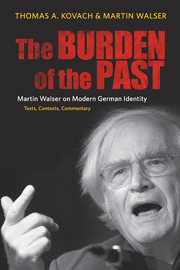Book contents
- Frontmatter
- Contents
- Acknowledgments
- The Burden of the Past
- Introduction
- Our Auschwitz (1965)
- No End to Auschwitz (1979)
- Handshake with Ghosts (1979)
- Speaking of Germany (A Report) (1988)
- Experiences while Composing a Sunday Speech: The Peace Prize Speech (1998)
- On Talking to Yourself: A Flagrant Attempt (2000)
- Conclusion
- Suggestions for Further Reading
- Index
Handshake with Ghosts (1979)
Published online by Cambridge University Press: 05 February 2013
- Frontmatter
- Contents
- Acknowledgments
- The Burden of the Past
- Introduction
- Our Auschwitz (1965)
- No End to Auschwitz (1979)
- Handshake with Ghosts (1979)
- Speaking of Germany (A Report) (1988)
- Experiences while Composing a Sunday Speech: The Peace Prize Speech (1998)
- On Talking to Yourself: A Flagrant Attempt (2000)
- Conclusion
- Suggestions for Further Reading
- Index
Summary
Context
IN THE SAME YEAR as the preceding speech (1979), Walser published an essay that, unlike the previous two texts, makes no overt reference to Auschwitz in its title; in fact, the title “Handshake with Ghosts” is deliberately mystifying, and suggestive of the more ambiguous and “literary” nature of the text that follows. Ironically, since one of the themes of the essay is the problematic role of the “public intellectual” in West Germany, the essay appeared in a collection edited by Jürgen Habermas, who is himself the epitome of the public intellectual and who thematizes the concept of the public sphere in much of his writing.
Walser's withdrawal from political engagement, which started around the mid-1970s, was also reflected in a shift from drama to prose as his primary sphere of literary production. In a 1986 interview he said:
For me the novel is a kind of intimate unfolding of consciousness, and it can achieve political relevance only in a highly indirect manner. But it's a different story with drama, with theater plays. Public speech on stage can be overtly political.
His association of his preferred literary mode of the last thirty years — prose fiction — with a very personal and only indirectly political stance is highly revealing, because the texts that make up the remainder of this volume — “Handshake with Ghosts” (1979), “Speaking of Germany” (1988), the Peace Prize Speech (1998), and “On Talking to Yourself” (2000) — all show clear signs of this “literary” stance, combined with a reluctance to adopt the role of public speaker, as he had in the 1965 essay.
- Type
- Chapter
- Information
- The Burden of the PastMartin Walser on Modern German Identity: Texts, Contexts, Commentary, pp. 35 - 54Publisher: Boydell & BrewerPrint publication year: 2008



